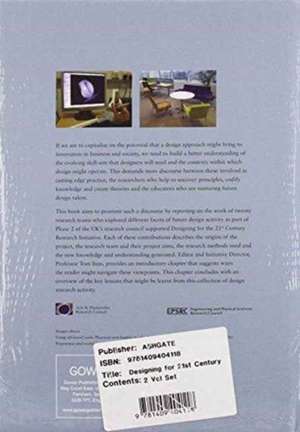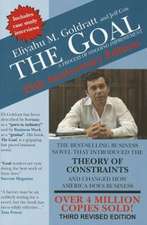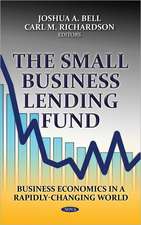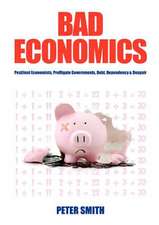Designing for the 21st Century
Editat de Tom Innsen Limba Engleză Hardback – 12 ian 2010
| Toate formatele și edițiile | Preț | Express |
|---|---|---|
| Paperback (2) | 283.14 lei 3-5 săpt. | +29.46 lei 4-10 zile |
| Taylor & Francis – 24 iun 2024 | 283.14 lei 3-5 săpt. | +29.46 lei 4-10 zile |
| Taylor & Francis – 24 iun 2024 | 306.06 lei 3-5 săpt. | +30.61 lei 4-10 zile |
| Hardback (3) | 745.77 lei 6-8 săpt. | |
| Taylor & Francis – 21 dec 2007 | 745.77 lei 6-8 săpt. | |
| Taylor & Francis – 4 ian 2010 | 773.59 lei 6-8 săpt. | |
| GOWER PUBLISHING LTD – 12 ian 2010 | 900.67 lei 6-8 săpt. |
Preț: 900.67 lei
Preț vechi: 989.74 lei
-9% Nou
Puncte Express: 1351
Preț estimativ în valută:
172.37€ • 177.82$ • 145.88£
172.37€ • 177.82$ • 145.88£
Carte tipărită la comandă
Livrare economică 04-18 martie
Preluare comenzi: 021 569.72.76
Specificații
ISBN-13: 9781409404118
ISBN-10: 1409404110
Pagini: 704
Dimensiuni: 172 x 244 mm
Greutate: 0.45 kg
Editura: GOWER PUBLISHING LTD
ISBN-10: 1409404110
Pagini: 704
Dimensiuni: 172 x 244 mm
Greutate: 0.45 kg
Editura: GOWER PUBLISHING LTD
Cuprins
Contents: Preface; Introduction, Tom Inns; Ideal states - Engaging patients in healthcare pathways through design methodologies, Alastair S Macdonald; The healing environment, Jacques Mizan; Designing healthy and inclusive public outdoor spaces for young people, Lamine Mahdoubi; The view of the child - Explorations of the visual culture of the made environment, Catherine Burke, Claire Gallagher, Jon Prosser and Judy Torrington; Orientating the future - Design strategies for non-place, Richard Coyne and James Stewart; Screens and the social landscape - Digital design, representation, communication and interaction, Carey Jewitt, Teal Triggs and Gunther Kress; Technology and social action, Steve Walker and Andy Dearden; Win-win-win-win - Synergy tools for metadesigners, John Wood; Embracing complexity in design, Jeffrey Johnson, et al; Emergent objects - Design and performance research cluster, Alice Bayliss and Joslin McKinney; Designing physical artefacts from computational simulations and building computational simulations of physical systems, Mark d'Inverno and Jane Prophet; Understanding and supporting group creativity within design, Hilary Johnson, Peter Johnson and Tim Coughlan; Nature inspired creative design - Bringing together ideas from nature, computer science, engineering, art and design, Thorsten Schnier, Russell Beale, Xin Yao, Bob Hendley and Will Byrne; Spatial imagination in design, Jane Rendell and Peg Rawes; Spatiality in design, John Stell, Lynne Cameron and Kenneth G Hay; Discovery in design -People-centred computational issues, Ian Parmee, Lisa Hall, John Miles, Jan Noyes, Christopher Simons and David Smith; Design imaging, Gordon M Mair and Kevin Miller; Sensory design and its implications for food design and presentation, Brent Richards; The emotional wardrobe, Sharon Baurley and Lisa Stead; Interrogating fashion - Practice process and presention - New paradigms for fashion design in the 21st century, Sandy Black; Design performance, Jillian MacBryde and James Moultrie; Index.
Notă biografică
Professor Tom Inns is Director of the AHRC/EPSRC Designing for the 21st Century Research Initiative. He is Chair of Design at Duncan of Jordanstone College of Art & Design, University of Dundee. He was formerly Director of the Design Research Centre, Brunel University, UK.
Descriere
Descriere de la o altă ediție sau format:
An exploration of emergent roles for design and the 21st century designer explored through the work of 21 research teams. Over a twelve-month period each of these groups held a series of workshops and events to examine different facets of future design activity. Each of the contributions describes the context of enquiry, the journey taken by the research team and key insights generated through discourse. Editor and Initiative Director, Tom Inns, provides an introductory chapter that suggests ways that the reader might navigate these different viewpoints.
An exploration of emergent roles for design and the 21st century designer explored through the work of 21 research teams. Over a twelve-month period each of these groups held a series of workshops and events to examine different facets of future design activity. Each of the contributions describes the context of enquiry, the journey taken by the research team and key insights generated through discourse. Editor and Initiative Director, Tom Inns, provides an introductory chapter that suggests ways that the reader might navigate these different viewpoints.










